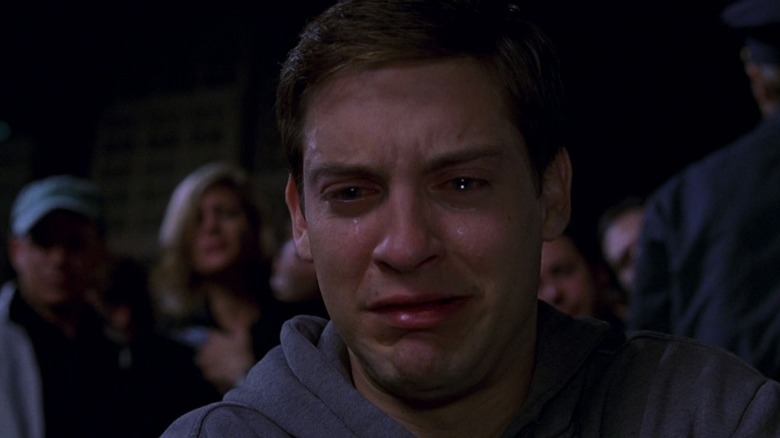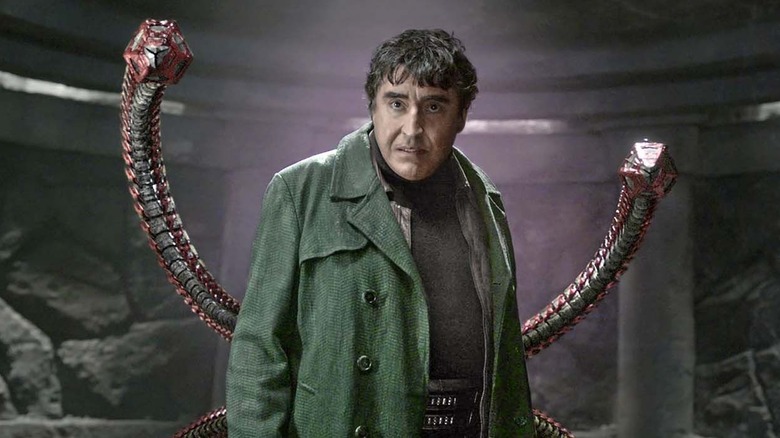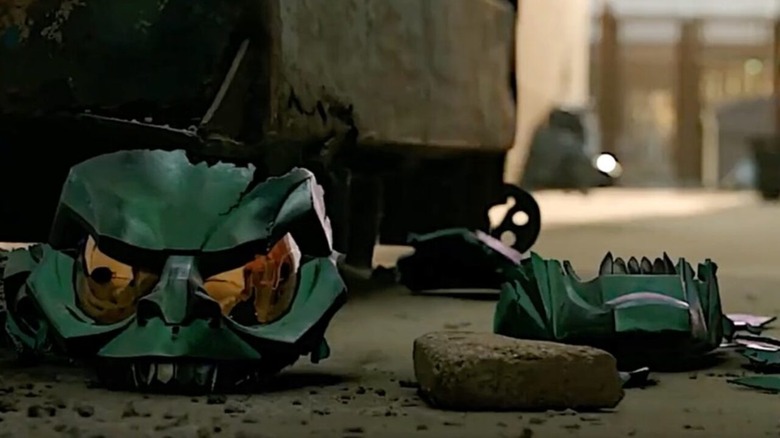Why Does Spider-Man: No Way Home Both Love And Hate The Sam Raimi Movies?
Like most of us, Sam Raimi loved "Spider-Man: No Way Home." Directed by Jon Watts, the third MCU Spider-Man film heavily borrowed from, paid homage to, and repeatedly poked fun at Raimi's own Spider-Man trilogy. While it's clear that Raimi is taking "No Way Home's" numerous gibes in stride, one can't help wondering why so much of "No Way Home" seemed concerned with simultaneously showing affection and disdain for the OG Spider-Man movies.
The aesthetic and narrative influences that Sam Raimi's Spider-Man trilogy have on "No Way Home" are many, so it's obvious that director Jon Watts and the powers that be affectionately recognize Raimi as a pioneer of the modern MCU. That said, this affection is also repeatedly hampered by the film's need to make fun of the same films it borrows so heavily from. There's nothing wrong with harmless jabs at the source material, especially when they're infrequent or used to point out the way the older material may have been dated or problematic in a way that is both fun and subversive. A great example of this can be found in the first live-action Scooby-Doo movie, which pokes harmless fun at the ways in which the source material was dated without trying to posit itself as superior to its predecessor. On the other hand "No Way Home," toes the line between playful love taps and throwing full blown punches.
Needless to say, there are spoilers ahead for "Spider-Man: No Way Home."
The Love — Very Obvious Fanboying
Part of what makes "No Way Home" so appealing is the wealth of clever references and nods to the various "Spider-Man" comics and movies that came before it. There are also allusions to real world memes and events that came about as a direct result of both the Sam Raimi and Marc Webb films — but mainly the Raimi films, without which none of the subsequent web-slinging features would have even been possible (or, in the case of "No Way Home," nearly as good). Because so many of us are pop culture-loving nerds who adored the Tobey Maguire movies, it makes sense that "No Way Home" would tap into that nostalgia by not only bringing back the villains of those movies, but repeatedly alluding to the most iconic moments from them as well. I mean, we got to hear Willem Dafoe say, "I'm something of a scientist myself" again, years after that same line in Raimi's 2002 "Spider-Man" became a well-loved meme. Doctor Octopus got to repeat his famous "Spider-Man 2" line, "The power of the sun ... in the palm of my hand." The tragic dynamic between Maguire's Peter Parker and Otto Octavius came full circle, as an older Peter wearily greets his former mentor with the same words he had told him years ago: "Trying to do better."
The return of Tobey Maguire, our first live-action Spider-Man, was a big deal that added to the overall joy of watching "No Way Home." Much of what was great about "No Way Home" was bringing back what was great about the Raimi films. Of course, there's also the glorious and heartwarming redemption of Andrew Garfield's Peter Parker, but this isn't about that — though there is something to be said about how "No Way Home" treats the Garfield-led films much more gently than the Maguire ones.
The Hate — Competition and Cringe Culture
This is about how "No Way Home" directly lifts cinematic and narrative elements from Raimi's films while also positioning itself as the "better" trilogy by, among other things, making the curing of Norman Osbourne/The Green Goblin a focal point, poking fun at the biological web production of Raimi's Peter Parker, and the numerous callbacks to the Raimi films that poke fun at their comparably more dramatic tone. Perhaps this is because the prevalence of cringe culture dictates that you can't like a thing too much because that's, like, totally uncool.
Maybe that's why there are so many little digs at Raimi's films sprinkled on top of the obvious fanboying, such as the whole non-fatal stabbing of the Raimi/Maguire Spider-Man (which added nothing to the story). In the age of liking things "ironically," it's considered a cardinal sin to pay homage in earnest, so the more unnecessary (albeit amusing) references that seem to be taking shots at the OG films seem like an attempt to temper an obvious reverence with a "too cool for school" attitude to avoid being a punchline — or, in this case, being seen as an inferior version of the source material.
Further evidence of this can be seen in the way "No Way Home" uses the multiverse concept to point out all the ways the MCU's Spider-Man and overall universe are "better." For example, the film makes a point to say that unlike Raimi's Harry Osbourne, Peter Parker's bestie in the MCU would never go crazy with grief, become a supervillain, and try to kill him. There's also a shared dialogue between the three Peters implying that Tom Holland's Spider-Man gets to face the "coolest" villains, and that, unlike his counterparts, he knows how to be a team player because he was apart of The Avengers — the superhero team that doesn't even exist in the universes of Garfield and Maguire's webheads. Additionally, there's also the fact that so many of the moments that make "No Way Home" memorable consist of addressing and retconning perceived "flaws" or heartbreaking storylines from the other Spider-Man films, making it clear that at least some of the motivation behind the story in "Spider-Man: No Way Home" was to cement the MCU's Spider-Man movies as the best of the bunch.
Instead, these efforts were a bit of an unnecessary hindrance. It is okay to love and enjoy things in earnest; in fact, it's preferable to pretending we only like things "ironically" or can only enjoy things if we make an effort to point out every perceived flaw in some weird effort to justify ourselves and our affection. I love "No Way Home," and I love all of the melodrama of Raimi's Spider-Man trilogy. There was never anything wrong with the more serious and dramatic tone of the Maguire-led movies, and it's okay to enjoy that without reservation or embarrassment! Without it, we'd have never gotten Willem Dafoe's Green Goblin, who is easily the best of any live-action Spider-Man villain from any Spider-Man movie. "No Way Home" wouldn't have been half as good without the rich, solid foundation of Sam Raimi's take on the beloved web-slinger and his world to build on. I don't think that one trilogy is better than the other because they bring different things to the table, and I don't want to pretend I never liked the originals in order to uplift the latest. I don't think one has to be painted as lesser or flawed in order for another to be seen as good. Getting hung up on making sure to come across as "cooler" or better than the Raimi movies just ends up undermining all the things that make "No Way Home" so great to begin with. The film could have easily just celebrated the unique qualities that each iteration of "Spider-Man" movies brought to the character and the audiences who love him without putting so much effort into trying to put down the predecessors it borrows so heavily from.


